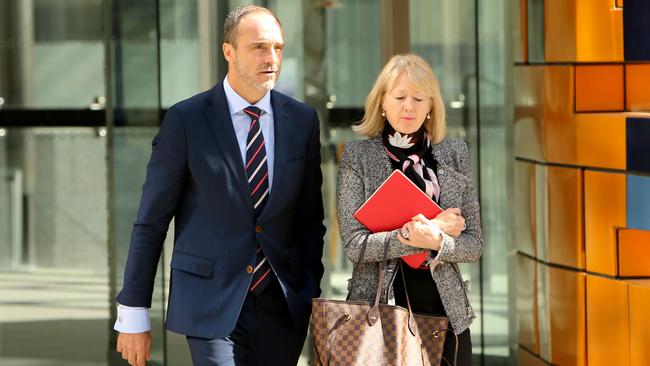Banks ‘put cash before customers’
Banks delayed their crackdown on dodgy practices in favour of more lucrative activities, an inquiry has heard.

Banks put off fixing systems that were supposed to stop financial planning customers from being ripped off in favour of ones that made money, the financial services royal commission has heard.
Giving evidence about Westpac’s failures to deal with poor financial advice, Michael Wright, the head of the bank’s planning division, BT Financial, yesterday admitted that it had taken too long to bring in closer monitoring of advisers.
“I reflect on the plans that we had in place in 2016, big plans that we watered down significantly for business prioritisation reasons,” Mr Wright said.
This followed Commonwealth Bank executive Marianne Perkovic yesterday agreeing that “the one thing you did have systems to track was to make sure that you were getting revenue”.
Yesterday, the commission also heard that advisers at CBA financial planning subsidiary Count continued to charge customers fees for up to a decade after they had died, and tearful testimony from a nurse who now fears she will have to work until she is 80 after her retirement dreams were shattered by shoddy advice from a Westpac planner.
Evidence over the past two days has also shed light on behaviour in the financial planning industry as it prepared for legislation cracking down on bad advice that the banks had fought against with great vigour.
The Future of Financial Advice laws were Labor legislation that the Coalition government planned to water down when it took office in 2013.
The Australian Securities & Investments Commission said it would not enforce the law while this was happening, but a Senate coup organised by then-Labor senator Sam Dastyari resulted in the full measures coming into force in November 2014.
CBA subsidiary Commonwealth Financial Planning initially started issuing fee disclosure statements to clients, as required by FoFA, in November 2013 — three months after the laws first came into force.
But it stopped again in December, after the new Coalition government announced it was going to weaken FoFA so that the statements were only required for customers taken after July 1 that year.
Yesterday morning, counsel assisting the commission, Michael Hodge QC, put it to Ms Perkovic that CBA then took “full advantage” of a grace period allowed by ASIC under which banks were allowed to continue breaking FoFA until July 1, 2015.
“We were still building the system at the time,” Ms Perkovic said.
Mr Hodge did not accept the answer, pointing out that “you must have built the system already because you had already been issuing fee-disclosure statements to the post-1 July 2013 customers”.
“Correct,” Ms Perkovic said.
“Yes. OK. Yes, we were improving the systems.”
The commission heard that Count’s “orphan client book” — a group of clients whose planner had left the company and who had not yet been assigned a new adviser — brought in $1.5 million a year in revenue.
Ms Perkovic admitted that Count knew in 2012 that clients were being charged fees for services they did not get.
However, the company did not report the breach to ASIC until September 2014.
Under the law governing financial services licensees, they are required to report serious breaches to ASIC within 10 days of discovering them.
Ms Perkovic said that a report to Count by big four accountancy firm Deloitte recommended the company “consider further investigation”.
“We needed to scope the problem and identify who the true orphans were in the book,” she said.
Counsel assisting the commission, Rowena Orr QC, asked Mr Wright why there was an 18-month gap between two audits of a Westpac planner who had consistently gotten poor marks, Andrew Smith.
“The implementation of FoFA required all resources, if you like, on deck to make sure that we were ready to go and fully operational,” Mr Wright said.
He denied Ms Orr’s suggestion Westpac “stopped auditing your advisers to put your resources into dealing with the FoFA reforms”.
“No, I didn’t say we stopped,” he said. “We reprioritised and, in Mr Smith’s case, that was reprioritised.”
Mr Wright admitted that “in hindsight, it doesn’t feel like the right decision” given Mr Smith’s previous poor audit results.
The commission heard Westpac identified misconduct by Mr Smith, including trying to ram purchases by 20 customers of a hybrid instrument — NAB capital notes — through the system on a single day. This was done on an “execution only” basis, meaning Mr Smith had not given any advice about the transactions.
However, “it was apparent that he advised the customers to enter into the transaction”, Ms Orr said.
Mr Wright agreed Mr Smith could earn significant fees by selling the notes.
Ms Orr asked him if he would “accept that those fees offered by NAB in connection with those NAB capital notes influenced the advice given by Mr Smith”.
“On the surface, it looks to me that it did,” Mr Wright replied.



To join the conversation, please log in. Don't have an account? Register
Join the conversation, you are commenting as Logout